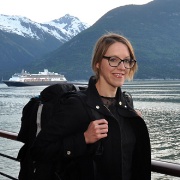
Profile
Dr Ellen Welch
Age 35
Role Repatriation doctor with Healix International and a GP in west London
Hours worked per week Ad hoc – I could do two trips abroad in a week and then nothing for the next few months
07.00
I wake up to the sun streaming through the hotel window in Anchorage, Alaska – a refreshing change from my usual drizzly commute through central London. I make the most of the morning with coffee by the sea and a swim in the pool, followed by a walk around the harbour. I’m on a trip to repatriate a sick traveller for Healix International, a private company that provides medical assistance to Brits abroad. I do this alongside working as a salaried GP in London and as a cruise ship doctor.
08.00
I arrived yesterday afternoon and met my patient in his hotel to make an initial assessment of his fitness to travel. He had collapsed almost a month earlier while on a cruise with his wife and was found to have a subarachnoid haemorrhage, which was treated with an endovascular coil. I start preparing for his transfer, checking my kit bag and paperwork and booking the transport to the airport.
09.00
During a phone call, the patient tells me how desperate he is to go home. He was initially cleared to return without an escort but developed some transient neurological symptoms, and it was decided the safest way for him to make the return journey was with a doctor.
10.00
I collect the patient and his wife and head to the airport. The patient remembers little about his collapse, but his wife recalls the whole episode. Getting ill is never much fun, but getting ill abroad in a confusing health system where people give you a bill for your treatment can be quite overwhelming. While there’s no language barrier here, I’ve repatriated patients from Turkey, Spain and Singapore, so it’s a bonus in the role to speak other languages – although most doctors I’ve met abroad speak at least a little English.
11.00
We arrive at the airport. I can see that the couple are exhausted by their experience and are ready for what they refer to as ‘a proper cup of tea’ and their own bed. At the airport, security take a great interest in the contents of the medical bag and they spend some time going through it. They want to confiscate my defibrillator and put it in the hold, so we have a lengthy debate, and they finally agree to let me take it into the cabin.
11.30
After getting wheelchair assistance through the airport, we’re off. We have two long but uneventful flights back to London via Seattle. We chat, read, watch movies, eat aeroplane food and I check his vitals every hour.
From a medical perspective, doctor escorts on commercial flights rarely have to intervene, but we need to be ready to do so if the situation deteriorates. We deal with a lot of cardiac patients, so I’m prepared for arrhythmia, further symptoms of chest pain and shortness of breath during the flight. But this job requires more of my GP and travel agent skills than my emergency medicine training.
01.30
We land at Heathrow and there are smiles from the patient. We start the two-hour car journey to his home and I call the office to update them on our progress. Depending on the nature of the case, we will either escort patients to a hospital for ongoing care, or back home, having arranged for outpatient or GP follow-up. I finish writing up my notes during the journey so the patient has a summary to give to his GP.
03.00
We reach the patient’s home. I help him get settled and check that there are no more questions or concerns. I get hugs from him and his wife and then bundle myself back into the car to return to London. The jetlag hits me – it feels like the middle of the night but it’s midday here. I’ll be at the office at around 5am to drop off the kit bag, and back in my own bed at 6am.
I enjoy the way that this job gives you more of a chance to get to know a patient than you ever would during a 10-minute appointment. It’s a privilege to get a glimpse into someone’s life while helping them to get home for a decent cup of tea.
Dr Welch’s workbook to help GP registrars with the CSA is out now. Read Pulse’s review of it here.
Photo credit: Sol Savoretti
Pulse October survey
Take our July 2025 survey to potentially win £1.000 worth of tokens
















